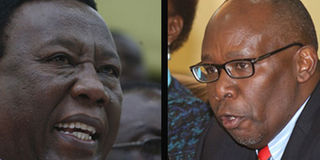State’s attempt to control religion dangerous

Bishop Mark Kariuki and Attorney General Githu Muigai. Religious groups need to be wary of the secular state getting involved in their affairs. PHOTO | NATION MEDIA GROUP
What you need to know:
- Religious groups need to be wary of the secular state getting involved in their affairs. Religious belief is a matter of individual conviction, and in many cases there is no written code of belief.
- The result is that government will be prescribing religious belief to the populace, and perhaps even punishing those seen to be practicing “false” religion. That will be the beginning of a slide into a theocracy, a situation envisaged by the makers of our Constitution when they clearly stated that “There shall be no State religion”.
Subsequent to the exposé on the con “prophet”, the government seems to have come to the conclusion that the best way to deal with this menace is to introduce controls on religious organisations.
The Attorney General has suspended the registration of new religious outfits and ordered existing ones to file returns in order to ensure they remain “legitimate”.
One ought to be surprised that there is almost unanimous support for this move by established religious groups. Perhaps they are happy to see the end of the likes of the “prophets” purveying fake miracles across the country.
Perhaps they expect that government control will bring them a measure of respectability and legitimacy, and reduce overall attacks on organised religion as a whole.
But there is a clear danger in this trend, both to the religious groups themselves and to the entire country as a whole.
Religious groups need to be wary of the secular state getting involved in their affairs. Religious belief is a matter of individual conviction, and in many cases there is no written code of belief.
How that belief is practiced or demonstrated varies widely, even within the same religious group. The government cannot have a tool measuring “legitimate” religious expression, and would therefore be handicapped when it comes to supervising religious activity in the country. Whatever measure is put in place will be at odds with at least some of the followers of some religious group.
If the religious groups allow the government to “control” them, it will create a slippery slope whereby it would be conceivable that some government in future will try to determine what is “true” religion and what is not.
The result is that government will be prescribing religious belief to the populace, and perhaps even punishing those seen to be practicing “false” religion. That will be the beginning of a slide into a theocracy, a situation envisaged by the makers of our Constitution when they clearly stated that “There shall be no State religion”.
PUBLIC FUNDS
This brings us to the second danger. A government that begins to use public funds regulating religion is contravening the principle of separation of State and Religion. As soon as a set of rules for the registration of religious organisations is established, the State will have established a religion, for all practical purposes. The rules will be similar to a code for “true” religion according to the State, thus excluding all those with opposing views. This must not be allowed to happen.
Are there ways of dealing with these exploitative “miracle workers” without establishing State rules for “legitimate” religion? In my view, existing laws are sufficient to handle the charlatans.
Whoever makes false medical claims should be treated the same way we treat quacks who run unlicensed medical clinics. Whoever extorts money from followers by making false promises should be treated the same way we treat other conmen and extortionists. Those who advertise fake cures must be held to the same standards as other advertisers. Media houses that carry these adverts must be held to the same standard.
As for the “fake” preachers whose celestial message is at variance with that of others in the same religion, we must treat them the same way we treat our politicians and philosophers. Listen to those whose message you agree with, and ignore the rest.
Dr Lukoye Atwoli is Consultant Psychiatrist and Dean, Moi University School of Medicine; [email protected]





